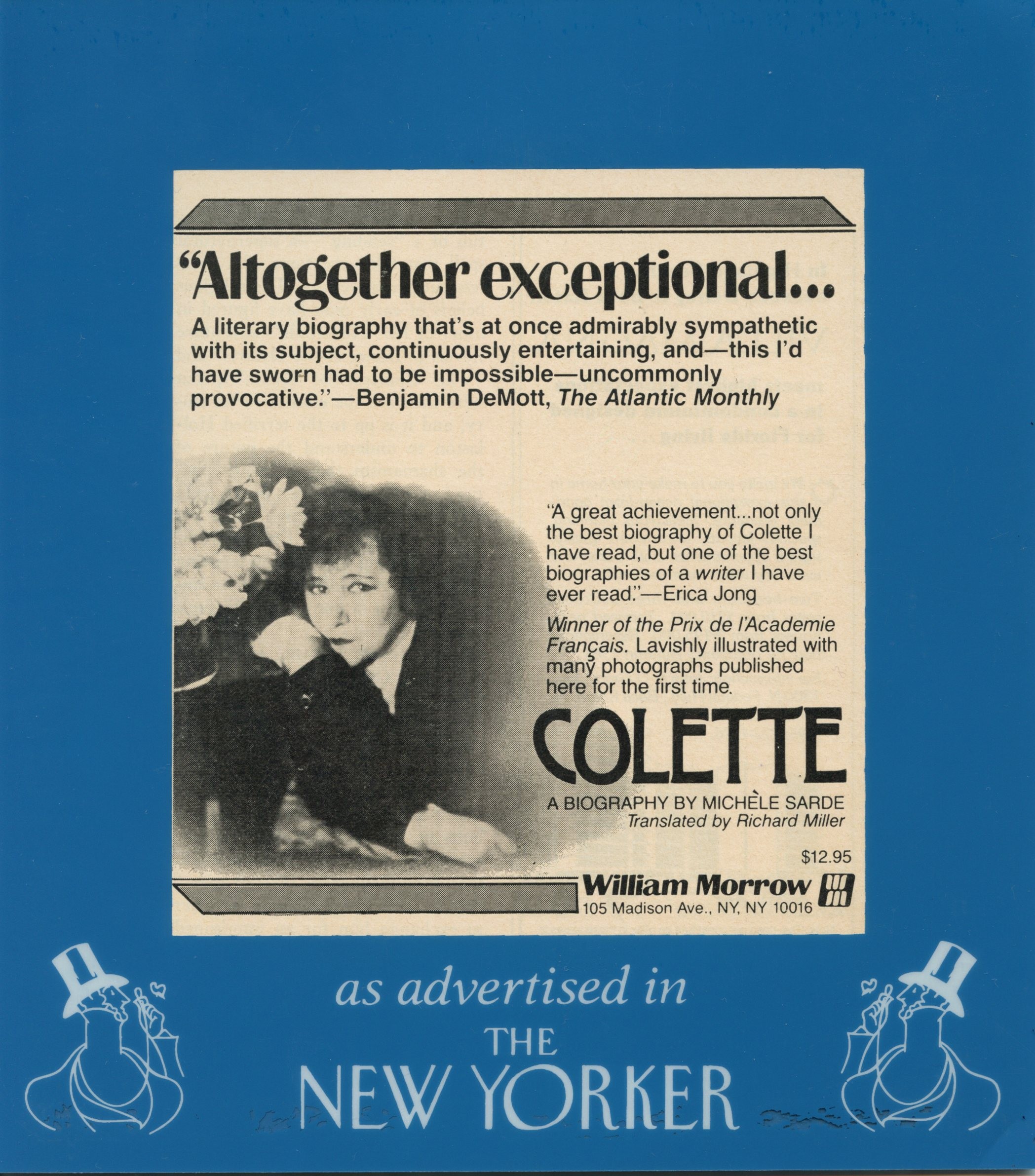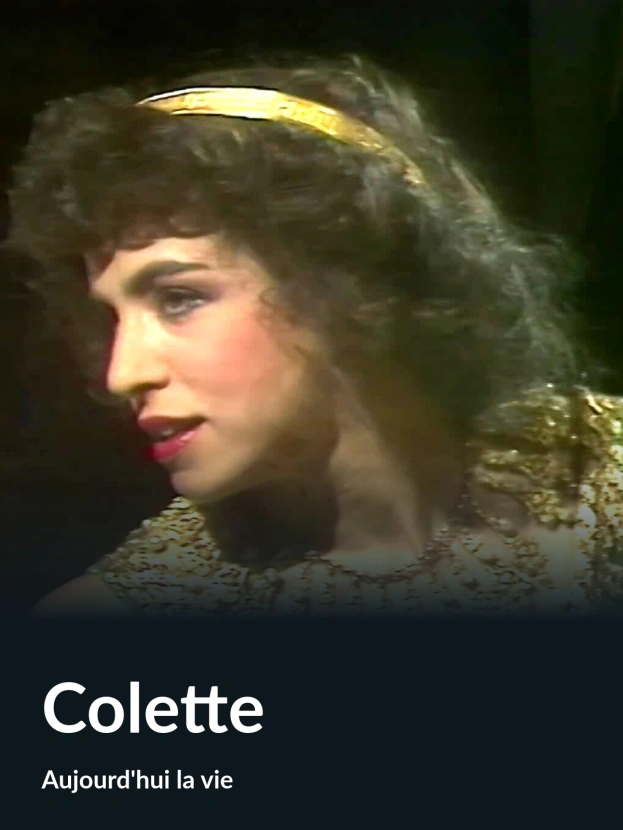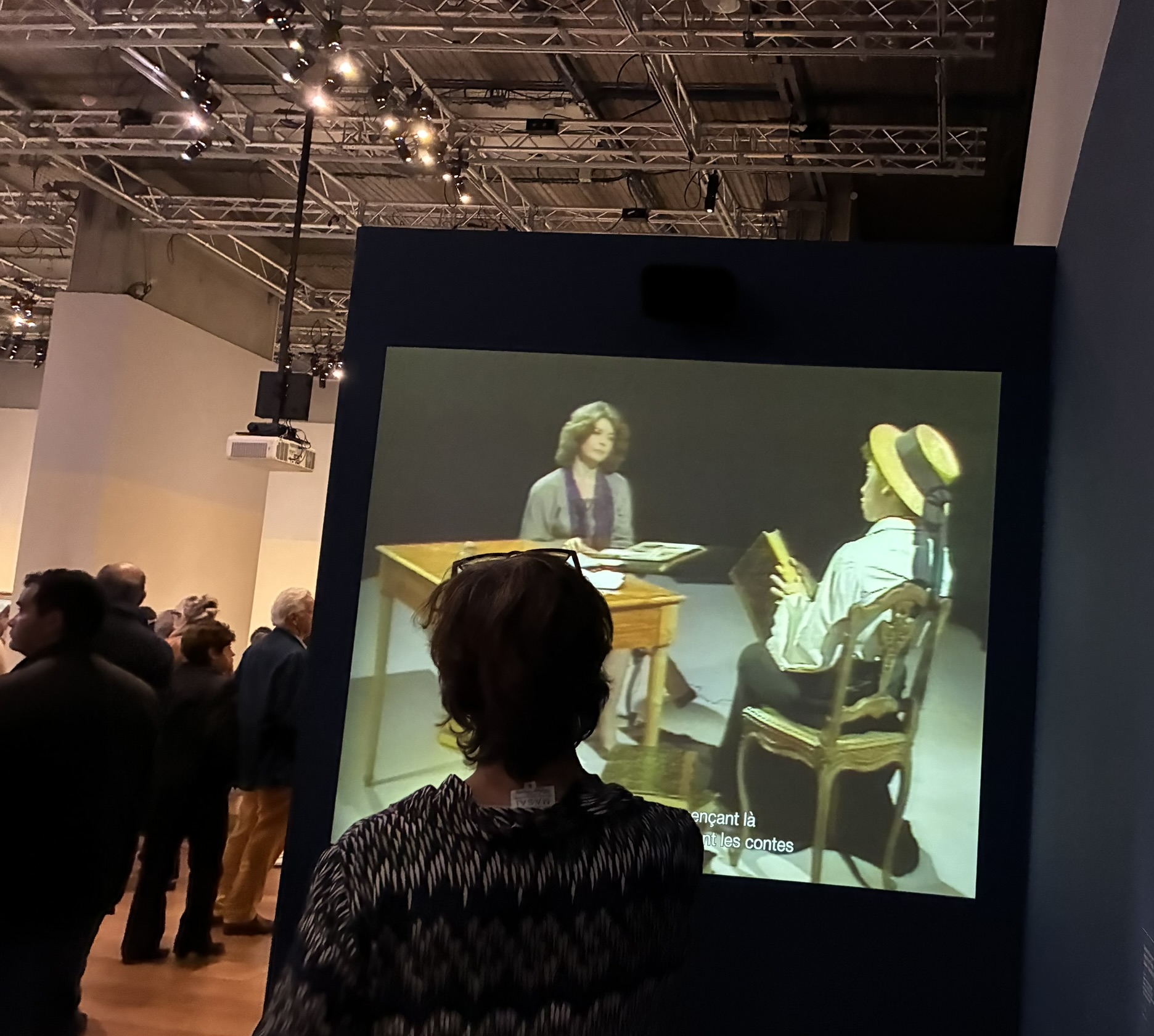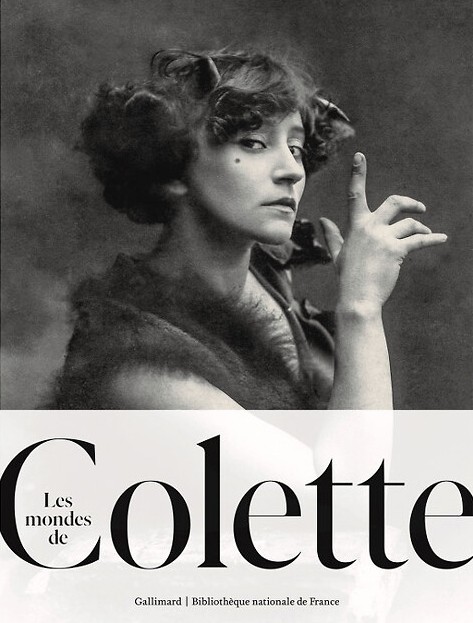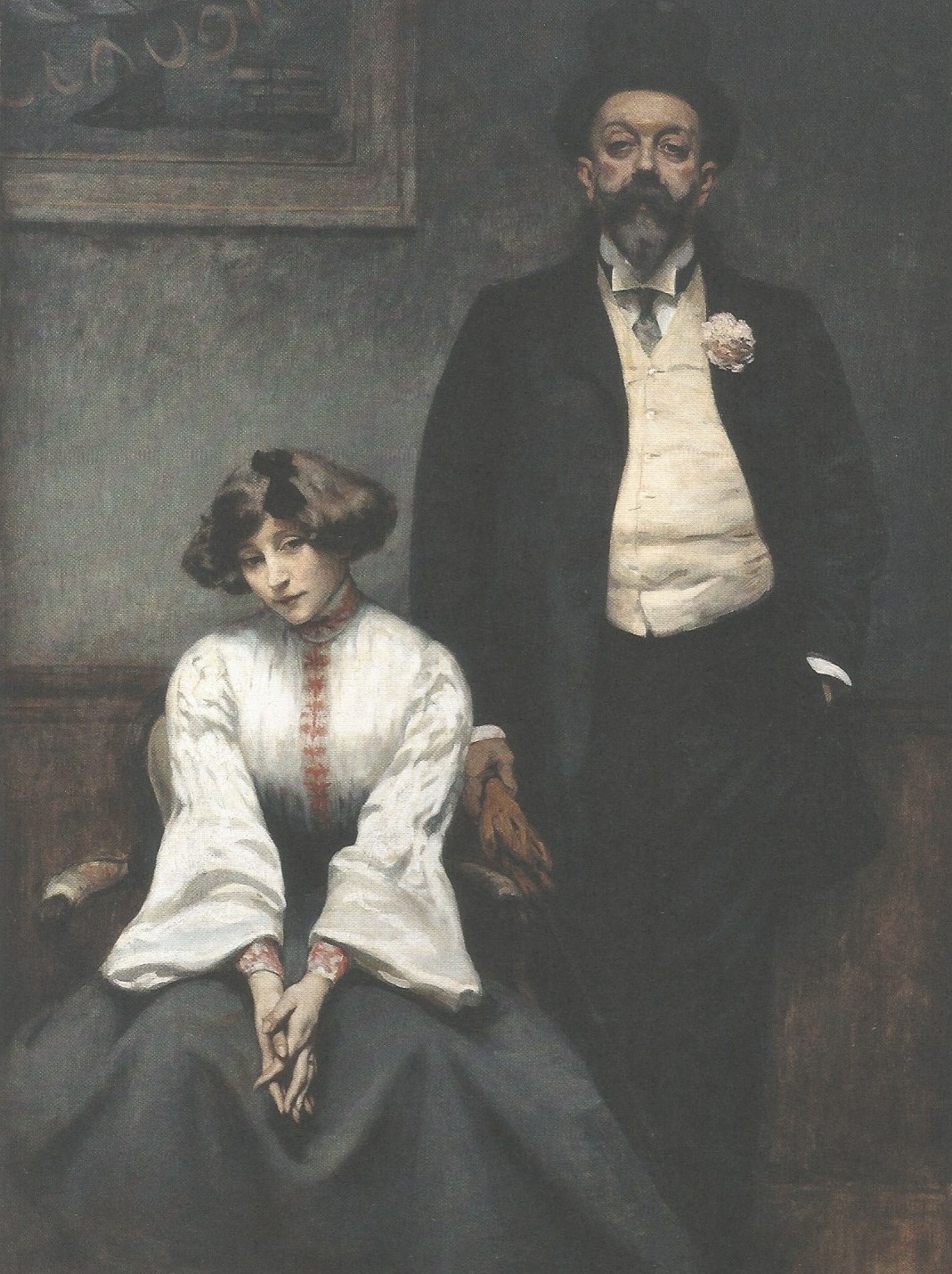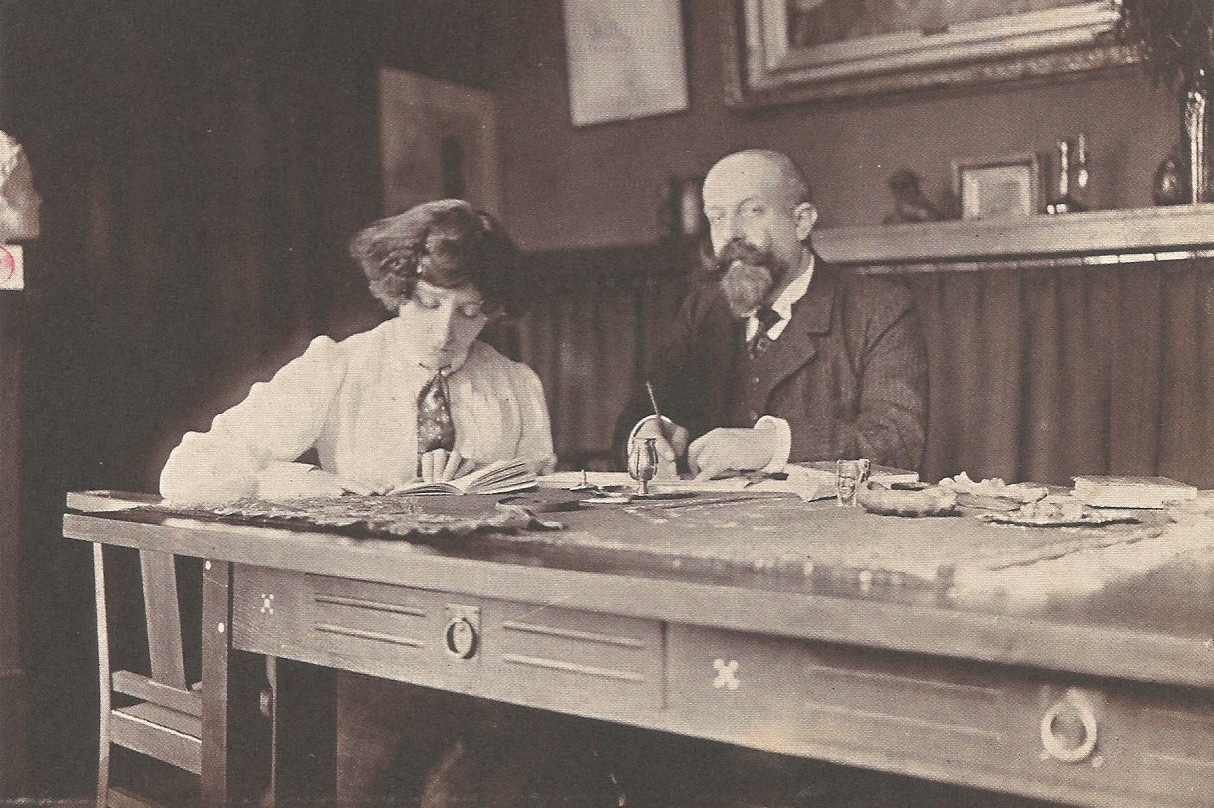Les maîtres-mots
Colette redécouverte
Avec Colette, libre et entravée, Michèle Sarde vient de faire franchir
une étape capitale au genre littéraire de la biographie biographisante propre à
André Maurois, ou à celle, psychologique et quelque peu anarchique, des essais
de Painter. Nouveauté du sujet, nouveauté des regards que Michèle Sarde porte
sur lui. Non seulement une autre Colette surgit de ce passionnant voyage au
centre de l’âme et de la chair d’une femme et d’un écrivain, mais aussi une
autre vision de l’histoire des réalités et des illusions sur lesquelles la vie
de Colette prit ses racines et put parfois s’épanouir à travers des genèses
successives.
Sa condition de femme
Mutatis mutandis, Michèle
Sarde, dans le domaine de la biobibliographie et de la littérature, peut être
comparée au grand Lucien Febvre qui combattit l’Histoire historicisante,
anecdotique, événementielle en faveur d’une relation du passé dans laquelle
interviendraient les sciences humaines, en une synthèse aussi large que profonde.
Michèle Sarde, de son côté, n’omet, pour cerner, dépister, voire traquer
Colette, mais avec une tendresse et une fraternelle attention tout à fait
exceptionnelles, aucune des sciences psychologiques – sans tomber dans le
jargon – aucun des schémas sociologiques, aucune des dialectiques et des
sémantiques historiques au sein d’une époque qui se convulse dans la grande
révolution du XXe siècle débutant. Toutes ces données, elle les
brasse, elle les assimile avec une maîtrise prodigieuse pour évoquer Colette et
son temps et surtout pour leur rendre leur mobilité physique, psychologique et
morale, leur émotion existentielle.
Colette, libre et entravée, certes, mais vivante ; vivante parce
que Michèle Sarde détourne Colette de sa mythologie univoque et féministe. Elle
montre l’ambiguïté, les contradictions, vécues avec une sorte de sérénité
volontaire, du féminisme de Colette qui se libère par la nudité, le saphisme,
le divorce et l’écriture (sans Willy), des contraintes et des pesanteurs de son
temps que Sido, sa mère, avait déjà ressenties avec une sorte d’instinct
libérateur, bien mis en évidence par Michèle Sarde. Mais Colette s’entrave par
le mariage et par la sensualité dont les désirs sont pour elle, comme le montre
avec force Michèle Sarde, à la fois des plaisirs et des liens.
Le féminisme de Colette ne saurait être annexé par le féminisme de notre temps. Il ne
rejette pas l’homme,il n’entend pas non plus l’égaler ou l’imiter. Il revendique son
sexe et ses singularités, et ses manques et ses spécificités, et ses libertés et ses
entraves. Colette tente de vivre totalement sa condition de femme.
Cette illustration de la vie
Pour illustrer cette thématique de Colette, pour la nourrir, avec une autorité et une
délicatesse de très grand style, Michèle Sarde pique à travers l’œuvre romanesque de
l’écrivain la phrase, le mot, la notation, l’impression suggestive, exemplaire,
avec une sûreté d’autant plus authentique qu’elle soumet tous ses exemples à la
critique.
Michèle Sarde a compris que le roman n’est que le masque de l’écrivain, son avers, sa
tête-bêche, ou son revers, plus vrai souvent que l’apparente réalité de l’écrivain,
un masque qui ne peut, lui, se cacher, et qu’il suffit non pas de soulever – Michèle Sarde
n’a pas commis cette erreur – mais de soupeser, de déchiffrer tel qu’il est. Peu de
biographes savent utiliser l’œuvre brute d’un écrivain ¡ Pas un ne l’a su pour Colette,
sauf Michèle Sarde, qui a bien saisi que Colette écrit aussi sa vie, la plus
riche, la plus souveraine, la plus libre, celle qui ne subit pas d’entraves.
C’est cette vie-là, cette vie d’une Colette qui s’illustrerait par elle-même, qui serait
complice de tous ses doubles, que Michèle Sarde repère, épie et investit avec une habileté,
une richesse et une érudition sans la moindre pesanteur.
De Colette à Michèle
Bien plus : Michèle Sarde a osé s’inscrire dans l’aventure que le biographe généralement
tente d’éviter ou de nier sous le prétexte d’une objectivité mensongère. Michèle Sarde a
accepté par avance d’écrire derrière la vie de Colette ce qu’on pourrait
appeler ses transfigurations personnelles.
Elle a ainsi adapté à l’histoire littéraire ce qui était le grand dessein de
Michelet lorsqu’il écrivait l’Histoire de France : s’écrire lui-même et devenir
Histoire dans le plus magnifique des accouplements de l’esprit.
D’où la complicité, la sympathie, l’amitié rigoureuse, exigeante même, et parfois critique
que Michèle Sarde porte à Colette. D’où cette pulsation rythmée par la chronologie du temps
relatif et des œuvres, cette sorte de volupté heureuse, aérienne, cet art de
l’écriture de Michèle Sarde, dans Colette libre et entravée, qui est par l’élan
même de la transcendance de la biographe à son sujet, déjà un art de grande romancière.
Ainsi, qui a mieux raconté en quelques lignes la mort de Colette que ne l’a fait Michèle Sarde ?
Commentant ce que disait Maurice Goudeket : « Soudain, ce fut le silence, et la
tête de Colette pencha lentement de côté, par un mouvement de grâce infinie... »,
Michèle Sarde écrit : « Son instinctif penchant pour la courbe et la sphère la
ramenait au cercle, et le cercle se fermait. Peut-être avait-elle retrouvé, tout au bout
du chemin de retour, le rayonnement sans entraves du corps maternel. »
Colette, libre et entravée ! Quelle joie ! Quel éblouissement !
Cette liberté, nous la
rencontrons comme lecteur devant une Colette, soudain ouverte à nos regards,
sans que nous ne soyons jamais des voyeurs ; car la pudeur de Michèle Sarde est
à la hauteur de sa franchise, c’est à dire magistrale.
NOTE
Une Colette entravée, mais aussi entravée, par delà ses déchirements, par le réseau
d’intelligence et de sensibilité dont Michèle Sarde a fait preuve au cours de
son essai. Une étude de première importance qui doit absolument être une date,
non seulement dans l’histoire de la connaissance de Colette, mais encore dans
celle de la biographie en France.
Joël Schmidt, Réforme
Libre et entravée
Colette notre contemporaine
Pas de purgatoire pour Colette. Pour une fois,
juste revanche, sa condition de femme la sert et lui vaut, vingt-quatre ans après
sa mort, un regain d’actualité. Non qu’elle fasse figure, aux yeux des
féministes militantes, de sainte patronne de la libération, ni même de
pionnière. Trop lucide pour accorder au deuxième sexe les qualités qui manquent
au premier, elle se méfie de l’animal humain sous toutes ses formes. Mais elle
connaît trop ses propres faiblesses pour refuser à son prochain, à sa
prochaine, les circonstances atténuantes qui tempèrent son pessimisme
d’indulgence. Et c’est son acharnement à découvrir la vérité, son génie à
l’exprimer, qui nous l’imposent comme une contemporaine bien plus que comme une
ainée.
On en trouve la confirmation dans
le gros livre que lui consacre Michèle Sarde, jeune agrégée de lettres,
professeur aux États-Unis. Lors d’un séjour au Togo, elle tomba, par hasard,
sur quelques romans de Colette qu’elle lut, faute de mieux, guettant les
coquetteries rétro, les dérobades, les complaisances du monstre sacré. Et elle
fut conquise, reconnaissant pour siens le combat de « la Vagabonde »
ou la patiente attente de « la Naissance du Jour ». Décidée à
poursuivre le dialogue avec cette semblable, elle entreprit la biographie qui
parait aujourd’hui. « Encore une ! », dira-t-on. « Il en existe
plus de vingt, sans compter les témoignages et la correspondance. Que peut nous
apporter cette dernière venue ? ». Quelque chose d’essentiel: un regard
neuf. Il s’agit moins d’évoquer le passé que de l’interroger, voire de le
contester à la lumière d’aujourd’hui. Moins d’arracher des secrets que
d’écouter une voix, celle d’une femme née en 1873, mais qui nous parle de si
près qu’elle forcerait les plus sceptiques à croire à l’éternel féminin.
De quoi parle-t-elle ? D’elle-même, de sa mère, de
l’école, des bêtes et des gens qu’elle rencontre.
Vous pouvez chercher, vous ne trouverez pas une
idée générale, pas une théorie, tout au plus quelques réflexions solidement
enracinées dans l’expérience et qui constituent une sorte de viatique, sans
aucune prétention morale. « Une enfance heureuse est une mauvaise
préparation aux contacts humains », constate-t-elle. Ou encore : « Le
premier homme, on ne meurt que de celui-là. » Elle le sait, elle y est
passée, elle tire sa sagesse de ses cicatrices. Que d’autres inventent, elle
garde ne nez collé sur la réalité, la sienne, et certains critiques
l’accuseront toujours de manquer d’âme. C’est un reproche dont les femmes ont
l’habitude, à croire qu’elles ignorent le mode d’emploi de cette âme dont les
hommes ont bien voulu les doter au Moyen Age. Convenons-en, le royaume de
Colette se situe ici-bas, mais allez donc en recenser les richesses, en épuiser
les mystères ! Durant quatre-vingt-une années, elle obéit au mot d’ordre
maternel : « Regarde ! », y trouvant sa raison d’être, s’acharnant ensuite à
« concilier sur le papier le son et le nombre » qui capteraient la vie. Et
parce qu’elle y est parvenue, nous voyons par ses yeux, nous découvrons notre
propre reflet sur la page qu’elle nous tend.
Bouder, pleurer et filer doux
Comme le souligne avec
pertinence sa biographe, elle est d’autant plus universelle qu’elle sort des
rangs, ambassadrice d’une piétaille vouée au silence. De Mme de La Fayette à
Simone de Beauvoir, de George Sand à la comtesse de Noailles, la littérature
française recrute la plupart de ses auteurs féminins dans « la haute »,
à une altitude que traversent les grands courants de pensée. Colette les
ignore. Elle sort de la communale, à regret d’ailleurs, « perdant la
secrète certitude d’être une enfant précieuse … pour ne devenir qu’une
femme ». Et qui pis est, une femme pauvre qui a la choix entre le métier
d’institutrice à 75 francs par mois (autant qu’une blanchisseuse) ou le
mariage. En quelques chiffres, Michèle Sarde nous explique pourquoi et comment
une jeune fille « coincée » tombe [...] dans les bras du premier Willy venu.
Dira-t-on qu’elle fait de
l’époux terrible un portrait trop noir ? Encore une fois, solidaire de Colette,
sa biographe [...] dénonce l’implacable pouvoir du dresseur. Comment expliquer
l’emprise de ce boulevardier, dont les facéties alimentent une centaine de
journaux parmi les trois mille quatre cents quarante-deux qui paraissent en ce
début du siècle, de ce plumitif qui signe à tour de bras les articles et les
romans fabriqués dans ses « ateliers de nègres », de ce pur produit
de la Belle Epoque, noceur, hâbleur, tricheur ? La réponse est toute bête :
c’est un homme. Il a pour lui la force et la loi, la tradition et « la
sacro-sainte souveraine et ignoble opinion publique ». Contre une telle
coalition que peut une Lolita de dix-huit ans, fraîchement arrachée à sa
Bourgogne ? Rien, sinon bouder, pleurer et filer doux.
Certes, d’autres cassent
la baraque, et Michèle Sarde nous cite les héroïques suffragettes qui jetèrent
leur corset 1900 par-dessus les moulins. Colette n’est pas du nombre et n’en
sera jamais. Soumise aux caprices du maître, elle rédige des souvenirs
scolaires qu’il pimente de grivoiseries et publie sous son nom. Il en ira de
même (à l’exception des « Dialogues de bêtes »), pour les dix livres
écrits au bagne conjugal et, jusqu’en 1923, Colette, quinquagénaire, divorcée,
remariée, auteur unique de plus de vingt romans, portera en littérature de nom
de Willy. Sans elle, qui s’en souviendrait aujourd’hui ? Encore, s’il avait
conscience des dons exceptionnels de son élève, peut-être lui pardonnerait-on.
Peut-être lui saurait-on gré d’avoir contraint à s’exprimer celle qui n’eut
jamais d’autre vocation que de vivre. Mais il l’exploite à l’aveuglette, la
congédie au premier signe de fatigue et charge une remplaçante, Meg Villars, de
poursuivre les « Claudine », avec la série des « Peggy ».
Et, dès que Colette montre les dents pour défendre son gagne-pain, il charge
ses nègres de la couvrir de boue dans un pamphlet dont la biographie nous offre
un atterrant extrait.
Où se réfugiera l’ex
provinciale de trente-trois ans, sans fortune ni appui ? Chez une femme... comme
jadis au temps béni de la chaude complicité maternelle, lorsque « nous
nous dilations d’aise loin des hommes ». Le saphisme est à la mode. Willy
et ses semblables le traitent en peccadille et les grandes cocottes oublient
volontiers, dans les bras les unes des autres, les ennuis du métier.
Malheureusement, Colette n’est pas une cocotte, mais une déclassée. Elle attire
les coups bas qui épargnent sa protectrice, Missy, duchesse de Morny, ancienne
séductrice de la princesse Poniatowska, descendante de Louis XV. Si, toutes
classes confondues, les amazones affrontent parfois les feux de la rampe, à
l’occasion de quelques mimodrame, seules les plus pauvres d’entre elles
découvrent en coulisse « l’envers du music-hall ». Apprentissage
exemplaire de la condition féminine dont Colette aura subi toutes les épreuves,
toutes les humiliations, jusqu’à devenir cette « petite commerçante
honnête et dure » qui « fait des livres comme on fait des
sabots », et qui, pour sauver la face, veille « à cacher ses pensées
et à se noircir les cils au mascara ».
D’un mari à l’autre, de la
mouise à la dèche, elle écrit, impose son génie, sans pour autant désarmer ses
censeurs. Comment lui pardonneraient-ils de dire la vérité, rien que la vérité,
celle qu’elle a touché du doigt au prix de quelques brûlures et dont elle
célèbre « les merveilleux saccages » ? D’accepter, d’innocenter la
dictature des sens, « seigneurs intraitables, plus ignorants que les princes
d’autrefois, qui n’enseignent que l’indispensable : dissimuler, haïr,
commander ? » De définir le vice comme « un mal qu’on fait sans
plaisir » et de clamer : « Femelle je suis, femelle je reste, pour en
souffrir, pour en jouir ! » Ni l’âge ni la gloire tardive ne la
contraignent à « se ranger », à jouer le rôle que la société lui
désigne. Aux approches de la soixantaine, elle se lance dans le commerce des
produits de beauté. « Imagine-t-on, nous demande Michèle Sarde, narquoise,
Gide ou Valéry convertis à la coiffure ? Malraux lui-même, l’aventurier
par excellence, se contenta de devenir ministre ».
Par son ardeur à vivre etson art de vieillir, son indépendance et sa sujétion,
son irrépressible naturel, Colette, l’unique, incarne la Femme majuscule, comme
cette « chatte dernière » à qui sa perfection valut d’entrer en littérature sous
le seul nom de La Chatte.
Gabrielle Rolin,
Le Monde, 22 Juin 1978
Colette femme et écrivain
Colette s’est souvent précédée elle-même, elle a précédé son temps... Peut-on connaître
sans masque cette « femme cachée » qui a vanté les vertus de la dissimulation ?
La biographie de Michèle Sarde lève le voile.
« C’était une rapide encore, celle-là. » On était le 4 août 1954, Colette était morte la
veille. Telle est l’oraison funèbre qui lui fut décernée par un vieux monsieur
aux propos toujours un peu grivois. La petite fille à laquelle il s’adressait
le regarda ébahie.
Une « rapide » ? Pour elle, Colette était un auteur de dictées, dont les descriptions de
violettes, rien de moins que palpitantes, étaient à imiter pour ses rédactions.
Cette anecdote illustre assez bien les deux masques derrière lesquels on a longtemps
relégué Colette. Ou bien c’était une femme scandaleuse dont on se détournait ou qui
émoustillait pour des raisons n’ayant rien à voir avec la littérature. Ou bien c’était un
écrivain qui peignait la nature et les chats avec des grâces à nulles autres
pareilles. On appelait cela le « démon du style », on saluait, et
l’on passait à côté. Avec un peu de chance, on connaissait l’auteur des
« Claudine » et de quelques romans dits populaires. Et, éventuellement, la vieille
dame pétrie de sagesse, recluse dans son appartement du Palais-Royal.
D’où vient que Colette, si connue, le soit si mal, et qu’on ne soit guère avisé, jusqu’ici,
de réunir toutes ces images et de les compléter ? Depuis quelques années, il est vrai,
des études sérieuses lui sont enfin consacrées. Partielles, elles aussi. Le
livre de Michèle Sarde, biographie, mais plus et mieux qu’une biographie, est peut-être
la première tentative de saisir Colette dans sa totalité, dans son évolution,
et sous son double aspect de femme et d’écrivain.
Car, dans le cas de Colette, la vie est partie intégrante de l’œuvre. Cela est évident dans
des livres comme « La Maison de Claudine » ou « Sido », où elle recrée l’enfance, la maison
familiale, le jardin et les bêtes, domaine enchanté sur lequel règne Sido, divinité tutélaire,
la mère bien-aimée. Il est permis de considérer cette Colette-là comme l’une des plus achevées,
des plus parfaites. Démon du style ? Oui, mais pas seulement. Personne ne sait, comme elle,
peindre le bleu originel de l’aube dont on se sent purifié. Transcrire la saveur des
sources pour vous donner envie d’y boire. Animer, et pas seulement décrire, tout
un univers, ce pays auquel elle appartient et qu’elle n’a jamais vraiment
quitté, quoi qu’elle en dise.
L’enfance, matériau de plusieurs livres. Mais c’est la vie entière qui dialogue avec l’œuvre. Et
quelle vie ! La femme qui fit scandale au début du siècle a un peu perdu,
aujourd’hui, de son odeur de soufre. Mais, loin d’en être démodée, elle
apparaît comme étonnamment notre contemporaine.
À l’époque des corsets, elle se fait un corps de gymnaste, apprend le mime, fait du music-hall
et danse sur scène « cosi cosi toute nue ». En 1906, à 33 ans, elle quitte Willy, son
premier mari, l’instigateur des « Claudine ». Divorce. Vit avec une femme, Missy,
l’une des citoyennes de Lesbos les plus célèbres de son temps. Elle se remarie à 39 ans avec
le baron Henry de Jouvenel, dont elle a une fille l’année suivante. Divorce une deuxième fois
à 52 ans. Rencontre alors Maurice Goudeket, le « meilleur ami », de seize ans son cadet, avec
lequel elle a une longue liaison, avant de l’épouser en 1935, à 62 ans. Elle
fait du journalisme, des conférences, du théâtre de nouveau. Elle écrit pour le
cinéma, elle voyage. En Bretagne, à Saint-Tropez, au Maroc, elle y est avant
tout le monde. Et, ce faisant, elle écrit infatigablement : soixante-treize
titres en quarante-neuf ans de vie littéraire. Sans compter les adaptations de
ses œuvres pour la scène, la correspondance, les articles de journaux, etc.
Il est prodigieusement intéressant de voir la vie et l’œuvre s’éclairer l’une l’autre, s’enrichir,
s’interpénétrer, et parfois se contredire. L’œuvre, souvent, a précédé la vie.
Dans « La Vagabonde », par exemple, écrite en 1910, l’héroïne refuse
les chances et l’aliénation d’un second amour, avec des accents d’une sincérité
frémissante. C’est ce qu’a fait Colette pour Auguste Hériot, milliardaire qui
l’aima et lui offrit la mariage. Mais, quelques années plus tard, lorsque se
présente Henry de Jouvenel, Colette accepte de l’épouser. La ressemblance entre
les intrigues est troublante. Où et quand Colette est-elle le plus fidèle à elle-même ?
Où est-elle le plus « vraie » ? Dans le roman, où elle peut s’exprimer sans contraintes,
bénéficiant du voile de la fiction, ou dans la réalité, dans laquelle elle ne peut pas
ne pas s’engager en toute connaissance de cause, puisqu’elle en a déjà vécu, par son roman,
les différents épisodes ?
D’après Michèle Sarde, au moment du mariage avec Jouvenel, la correspondance de Colette est « sans
équivoque ». Elle y apparaît parfaitement heureuse, s’engageant sans réticences ni regrets.
Sans équivoque, vraiment ? La correspondance n’est-elle pas aussi souvent voile que dévoilement ?
Moyen de se convaincre soi-même en essayant de convaincre les autres ?
Du reste, on n’a pas assez remarqué que cet écrivain présumé simple et limpide ne l’est pas tant
qu’il y paraît. Sous la transparence du style, Colette reste la « femme cachée ».
C’est qu’elle est particulièrement virtuose dans l’art de la dissimulation, « l’estimable
dissimulation » qu’elle a constamment vantée. « Feindre sans défaillance, longuement, par
silence, par sourires, devenir en apparence une autre personne, voilà qui relègue loin le petit
mensonge bavard. » Elle prétend l’avoir apprise de Sido, sa mère, du « Capitaine », son
père, de la fréquentation des chats et de celle de ses amis homosexuels. Elle l’a apprise par
nécessité dans l’expérience conjugale avec Willy, elle l’a pratiquée par amour. « La tâche
dévolue à celui qui aime le mieux : la fourberie quotidienne. »
Ainsi, le mensonge peut être une vertu. Ce qui n’est pas pour nous étonner de la part d’une
moraliste aussi peu conventionnelle. Sido lui « a appris que le bien et le mal
avaient souvent un éclat égal, et qu’ils étaient dignes, l’un et l’autre, d’un
intérêt passionné ». Le bien et le mal, le pur et l’impur, la vérité et le
mensonge, la vie et sa destruction. L’opposition n’existe pas chez Colette
entre ces contraires. Ils coexistent, ils sont équivalents. Elle s’est si
souvent et si hautement défendue d’avoir des idées générales qu’on se demande
si ce n’était pas pour mieux dissimuler la charge explosive d’une pareille
éthique. Il faut donc se méfier des lectures trop promptes à la figer, à la
séduire, à l’aseptiser. Et constater son irréductible ambiguïté.
Dès lors, faut-il se préoccuper de savoir où elle a été le plus sincère, dans l’œuvre ou
dans la vie ? Dans « Le Fanal bleu », cinq ans avant sa mort, elle redit encore :
« Pour la femme comme le chat, le mensonge est la première parure... » – il est vrai
qu’elle ajoute : « d’une amoureuse ». La femme, amoureuse ou non, est condamnée à
la « parure » du mensonge, au voile, à la dissimulation. Pour Colette, femme à l’esprit
trop libre et trop en avance, la création littéraire, ce moyen privilégié de dissimulation,
a été le moyen privilégié de vivre, de s’affirmer, de se révéler derrière les voiles.
Car tout est possible et permis dans la fiction, même les exagérations caricaturales et
vengeresses. Les femmes osent traiter l’homme, leur inférieur, comme un produit à consommer :
« Je n’aime pas le veau, je n’aime pas l’agneau ni le chevreau, je n’aime
pas l’adolescent. » Ou comme un objet décoratif : « Il ne manque à ce
costume-là qu’un homme gris foncé... Mais c’est un accessoire cher. » Elles
osent prendre conscience de leur valeur, elles osent vivre seules, libres,
indépendantes. L’homme serait-il déjà figé dans son rôle d’ennemi
irréconciliable ? Dans les romans de Colette, les hommes sont souvent veules,
inintéressants, méprisables. Mais Colette n’a pas écrit que des romans, et elle
a prêté aux hommes ses amis la plus fervente attention.
Et que vouliez-vous donc que Colette, la femme, fît à l’époque où elle vivait ? Elle a pris
conscience de sa spécificité féminine, de sa liberté. Elle l’a écrite. Mais elle n’a pas
eu le pouvoir de susciter une conscience équivalente chez les hommes. Lucide,
mais amoureuse et peu douée pour la solitude, il lui fallait bien vivre ses
amours selon les normes en vigueur. Michèle Sarde semble l’avoir oublié.
En revanche, ce qui transparaît dans son livre, mais aurait gagné à être exprimé plus clairement,
c’est que l’expérience de Colette, individuelle et isolée, est devenue peu à
peu l’expérience collective de toutes les femmes. Et, bien que la vague de
conscience féministe commence à atteindre les hommes, il y a eu, en fait, si
peu de changements profonds que cette expérience non seulement reste
parfaitement actuelle, mais est probablement beaucoup plus exemplaire pour nous
qu’elle ne l’était à son époque. Colette s’est souvent précédée elle-même. Elle
a précédé son temps. C’est à peine, aujourd’hui, si nous arrivons à la
rejoindre.
Rosa Laisné, L’Express Magazine, 14 au 20 août 1978





